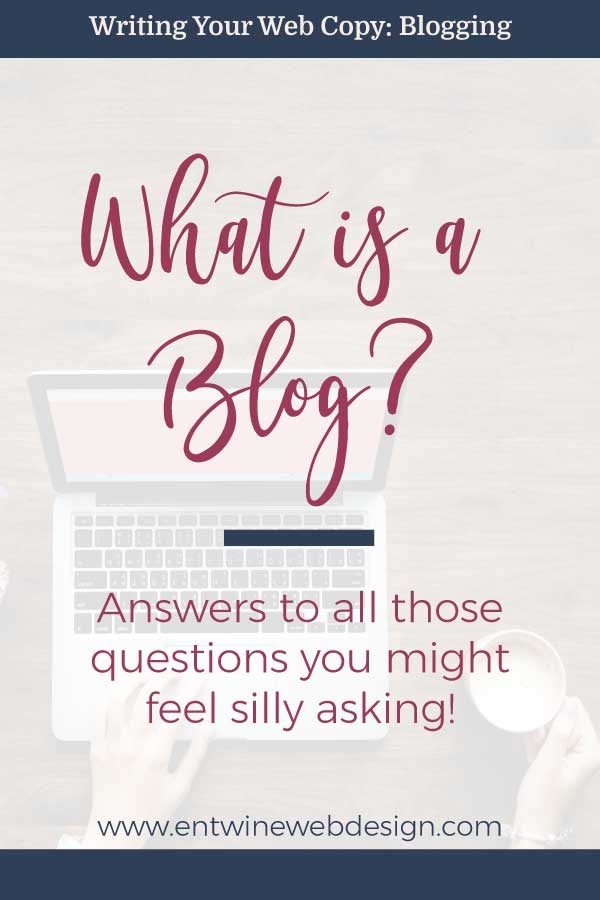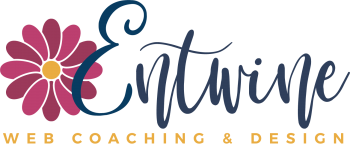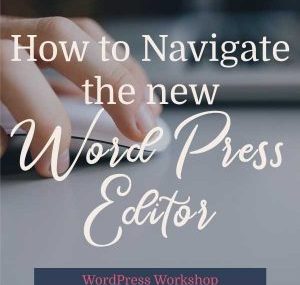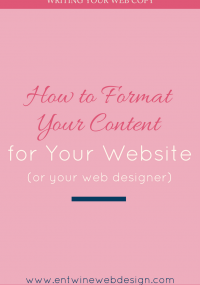
Last week, one of my students who is just beginning her journey into the online world as a business owner, asked about a blog – “What is it? What’s it for? Is there a certain format?” She’s interested in blogging, but she’s “not really clear on what ‘it’ is.”
These are valid questions, as it can get confusing. Some people refer to websites. Others refer to blogs. Both are online. So, what the heck’s the difference?
Let’s start at the beginning…
What is a website?
A website is any place online that has a domain name, or URL. If you type an address into the address bar at the top of your browser, you will go to a website. The entire internet is made up of millions (probably billions) of websites that are all linked together.
Some of these websites are also blogs, which brings us to the next question.
What is a blog?
Essentially, a blog is a feature of a website that involves writing articles and sorting those articles by category or topic. Because the focus of some websites is the blogging feature, we refer to those types of websites as blogs. But they are merely websites that focus on blogging.
We refer to articles that are written on a blog as a blog or a blog post. Bloggers sort posts both chronologically and by topic, in categories. Visitors can also often comment on blog posts. Visitors cannot comment on standard website pages, like the About page or Homepage.
The process of writing an article that will appear on a blog is called blogging.
The term blog originated from the two terms “web-log.” If you’re old enough (like me), you might remember people writing “weblogs.” At the time, not many people knew what a weblog was, and nobody knew what the heck it was. Eventually, “weblog” got shortened to “blog” and became what we now know as blogs.
When people ask, “should I start a blog or a website?”
That’s really the wrong question. If you’re going to go online, you’re starting a website. Period.
The question is, will your website have a blog?
What is a blog for?
A blog can be created and written for a huge variety of purposes. Some people write blog posts merely to reflect and share their experiences. Others make incredible money through their blogs. The focus of these types of websites is the blog and blogging.
There are also websites, like this one, that have a blog but their focus is to build a business. In that case, the blog is part of a business’ content strategy but that type of website wouldn’t be considered a blog. It would be a website with a blog.
Having a blog on a website allows the owner to share timely and relevant content. It gives a website a boost of SEO juice because there’s new content on it regularly for the omnipresent Google bots to check out. There are actually quite a few really good reasons to blog, especially if you’ve got a business website.
What’s a blog site look like?
Let’s look at the menu for a site that has a super active blog as well as a business component. Rachel Hollis is a writer, blogger, and podcaster. If you look at her menu in the image below, “Style, Work, Family, Travel, Recipes, and Videos” are all links to blog category pages.
If you were to click on “style” you’d go to a page that listed ALL of her posts about style. Her posts on this page are organized by category, or topic. Her website totally focuses on her blog.

The last three items in her menu, “About, Shop, and Subscribe” are standard menu items for business websites.
In this case, Rachel has chosen to emphasize her blog and podcast (the header image below the menu is all about her podcast) because that’s how she connects with people. She’s a prolific content creator between her blog posts, books, and podcast episodes.
Rachel Hollis is definitely a blogger as her site’s focus is on content and the blog.
Is there a specific format for blogs?
There are probably as many accepted formats for blogs as there are blogs. But again, we’re talking about two different things here – I know, confusing – 1) websites with a blog focus and 2) individual blog posts.
A website with a blog focus will be formatted differently then a website that does not focus solely on blogging. Generally, the blog posts will be highlighted on the homepage and categories will be in the menu.
You’ll also note blog pages will be formatted differently. Some blogs have sidebars like you see to the right of this post. Others don’t. Again, that comes down to preference and the goals of the website.
Then, blog posts can be formatted differently depending on the topic. If you cruise around the web and visit some blog posts, you’ll see that business blog posts tend to be formatted quite differently than posts on a fashion site or a lifestyle blog. Food bloggers have a whole other format that they tend to follow for all of their recipes.
Blog post formats tend to vary from industry to industry or niche to niche. If you want to start a blog in a particular niche, visit blogs in that area and analyze the structure of their posts to see if you can deduce a particular format.
I tend to use a similar format for all of my blog posts as I find following a basic structure makes writing them a bit quicker, but there’s not necessarily a right or wrong way to write a post.
I do know that WordPress is in my opinion the best blogging platform. WordPress was originally designed as a platform for bloggers, and I LOVE it for web design and it’s blog functionality. There is a learning curve, but once you figure it out, it’s uh-may-zing!
Conclusion
If you’ve got a domain name and a home online, you have a website.
If you write articles and sort them by category and tags, you also have a blog.
If the blog function of your website is the focus of your site, you can refer to your website as either a website or a blog, which would make you, my friend, a blogger.
Whether you decide to add a blog to your website really depends on your website’s goals. Start with your goals before you figure out the strategy for your website and what would be best to include on your site.
So, blog vs. website is the wrong question. You should be asking, “Should be my website have a blog or not?”
Hope this helps! If you have any more questions, ask away in the comments, and I’ll do my best to clarify any confusion!
xo,
Amy



